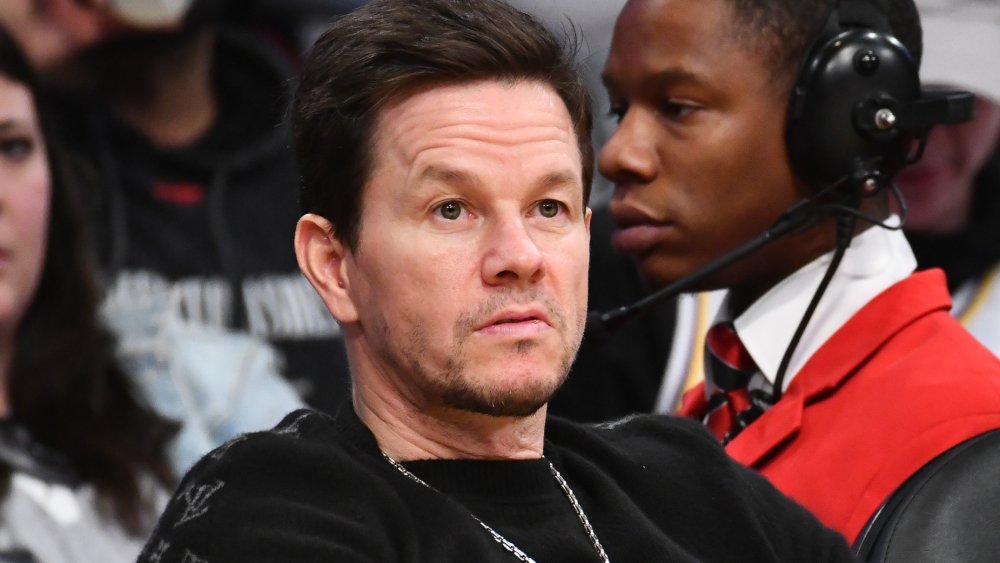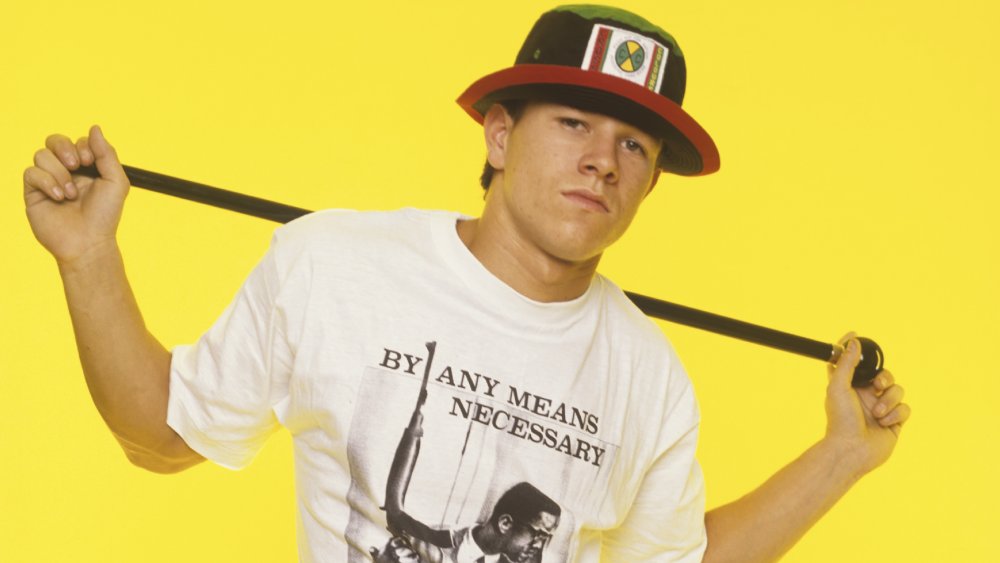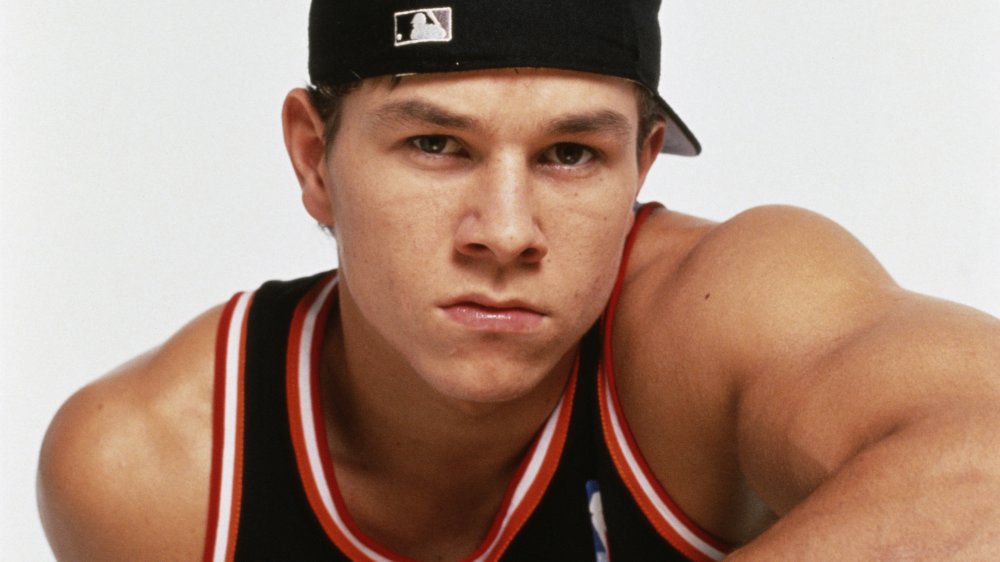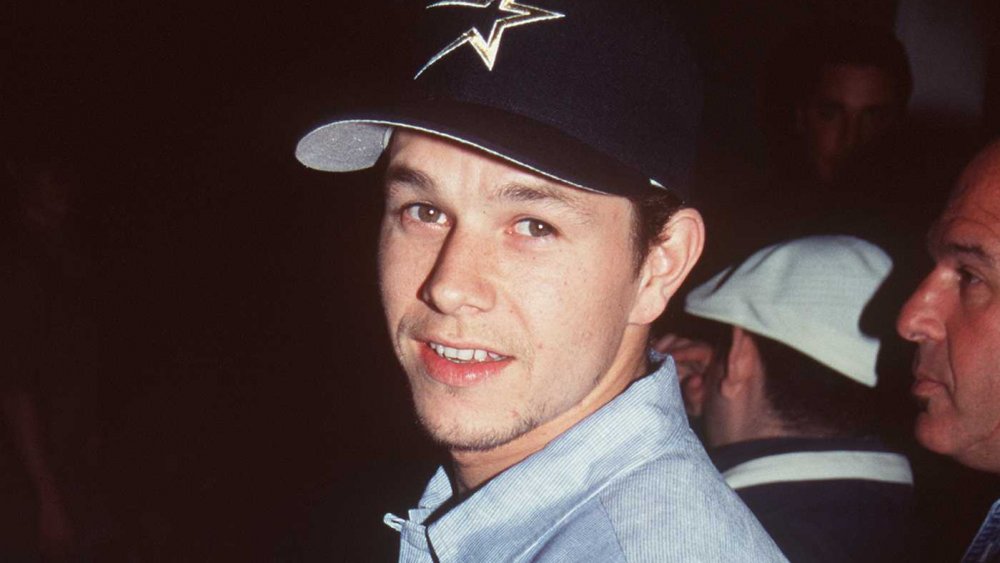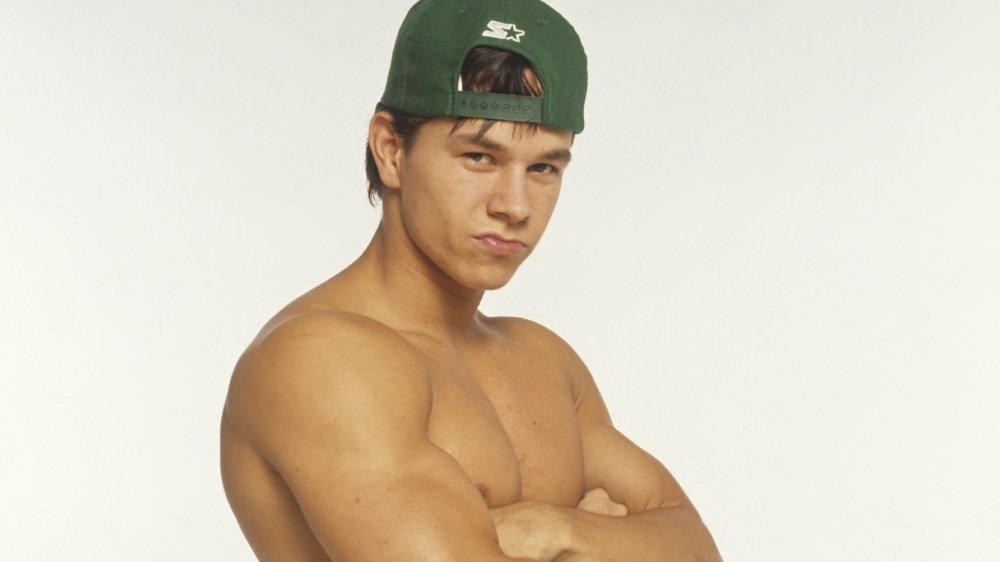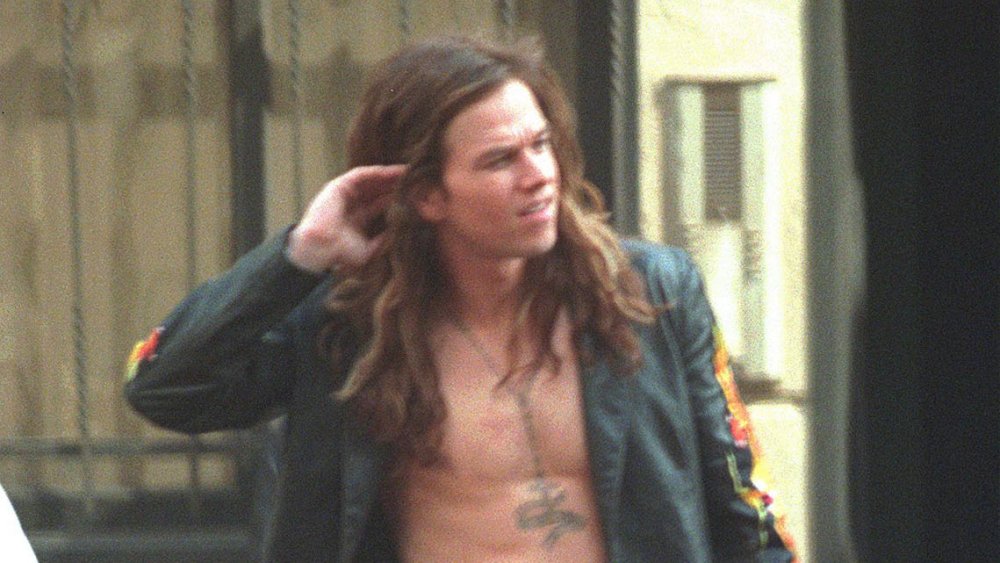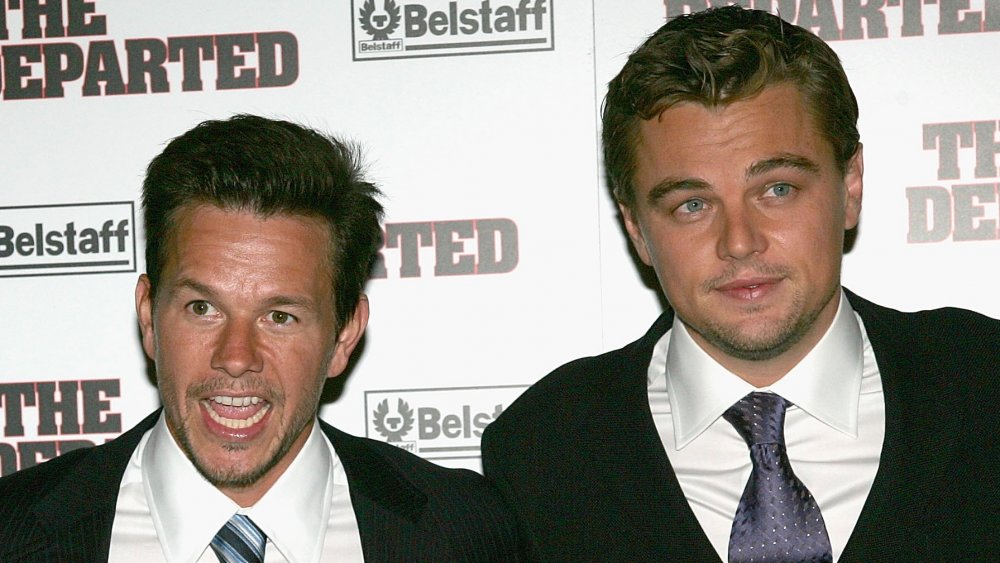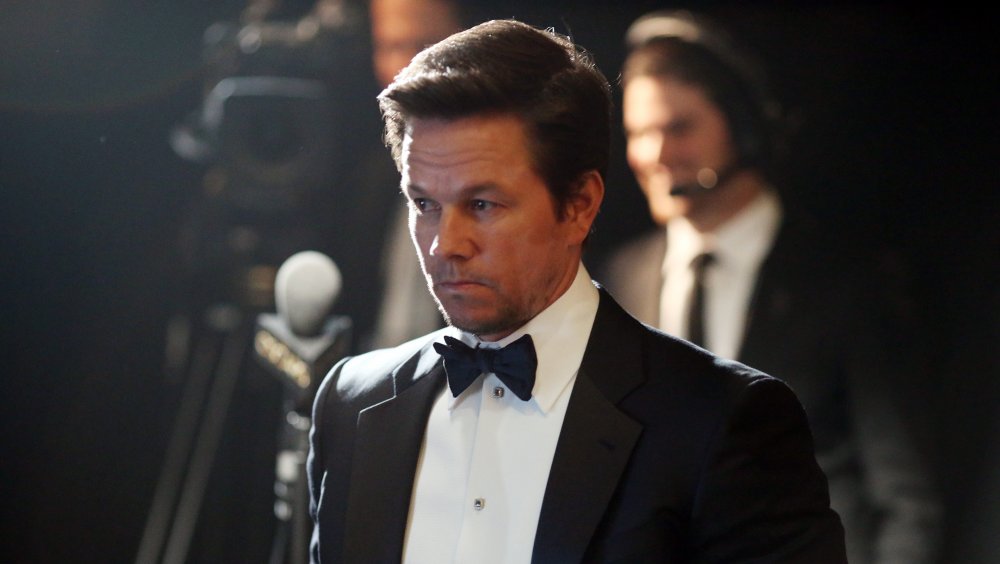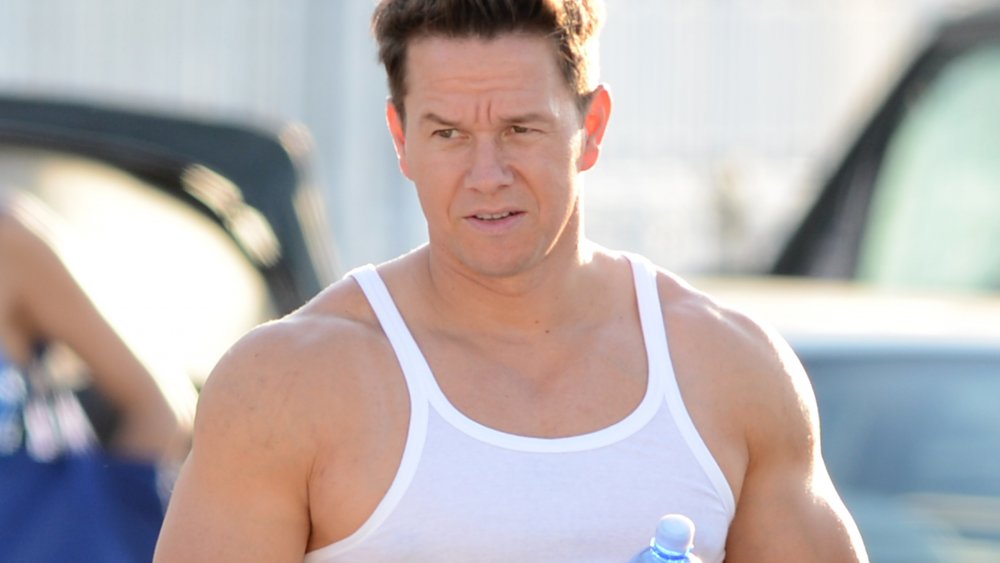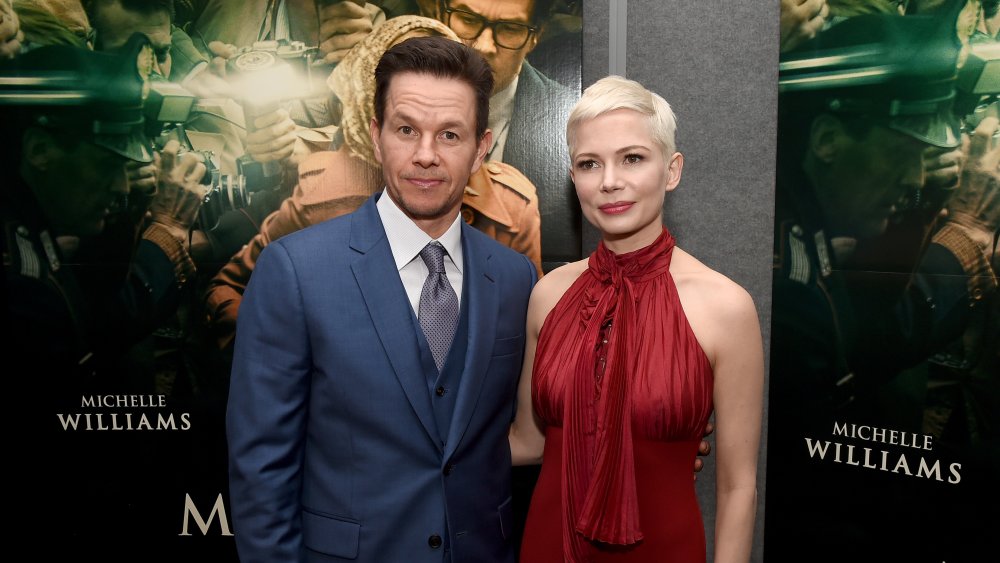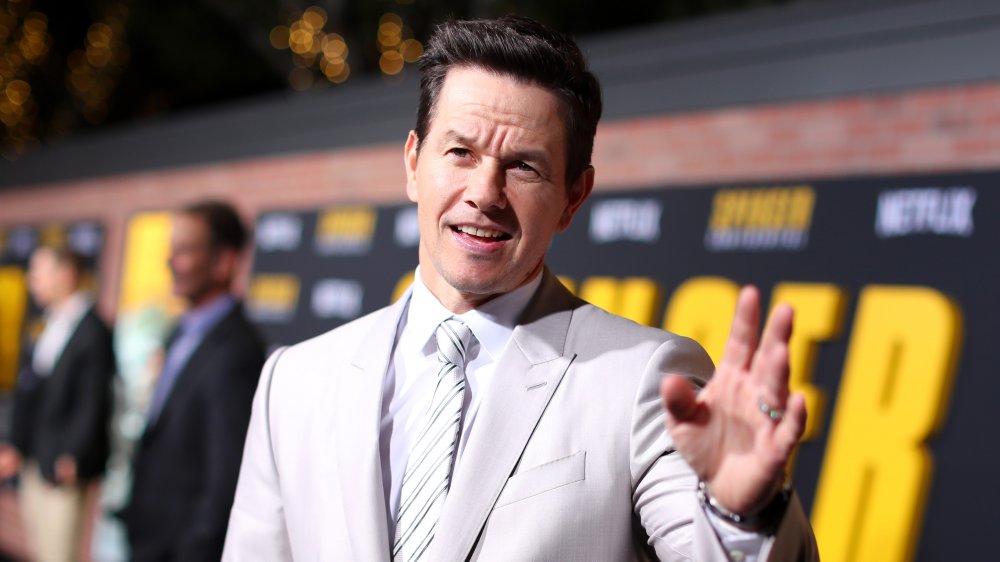The Shady Side Of Mark Wahlberg
Mark Wahlberg has come a long way since he dedicated his 1992 memoir, Marky Mark, to the, uh... funkiest member of his "bunch." Unsurprisingly, the Hollywood star came to regret the immature stunt, and that's probably not the only thing Wahlberg wishes he could expunge from his past. The Boston native shot to fame in the early 90s as the frontman of Marky Mark and the Funky Bunch, a hip-hop five piece whose debut album spawned the platinum certified single "Good Vibrations." But Wahlberg doesn't like to talk about his rap career, which is understandable in retrospect (Consequence of Sound included "Good Vibrations" on its list of the worst hip-hop chart toppers ever), but the truth about Wahlberg's regret is that it has nothing to do with his rhythm — or his rhymes.
Marky Mark's public image was that of a street wise bad boy, and it wasn't an act. The youngest of nine kids, the future A-lister grew up in the rough-and-ready South Boston neighborhood of Dorchester. His parents separated when he was 11 years old. "My parents cared, but we were left to our own devices, so we got into trouble," he told Forbes. Most kids get into a little trouble as they navigate their way to young adulthood, but Wahlberg was on another level. And even after his Hollywood break, it would take years for him to maintain a straight-and-narrow path. Let's take a look at the shady side of Mark Wahlberg.
Teenage Mark Wahlberg was out of control
It didn't take long for Mark Wahlberg to start going off the rails when his parents split up. Just two years after his mother (a nurse) and his father (a truck driver) divorced, the youngest Wahlberg child began dabbling with hard drugs. At just 13 years old, he started using cocaine, and the drugs were only the half of it — the eventual high school dropout was also stealing cars and sticking up rich kids by this point. "We wanted what we didn't have, so we went out and hustled," Wahlberg told Forbes. The actor joked about his criminal past during a 2011 episode of 60 Minutes. Asked if he was a good thief, Wahlberg said: "I was pretty good. I was pretty good. I was pretty daring."
According to Father Jim Flavin, Wahlberg would regularly wave at him as he drove around the neighborhood in stolen cars he was barely big enough to operate. The local parish priest spoke to 60 Minutes for the show's segment on the controversial actor, recalling one particular courtroom appearance that left him in doubt about where Wahlberg's future lay. "He was just pouring it onto the judge, you know, 'I'll never do it again,'" Flavin said, adding, "He was wonderful. He started tearing up, and the judge just melted. [Wahlberg] looked at me and winked. And I said, 'You little bugger.' That was an Academy Award performance in the courtroom."
The start of Mark Wahlberg's racially charged incidents
During Mark Wahlberg's turbulent teenage years, he also allegedly committed more than one racially motivated crime. On June 15, 1986, the then 15-year-old and three of his friends spotted an African American boy named Jesse Coleman, aged just 12 at the time. Coleman was walking home with his older brother and sister when Wahlberg and his associates started tailing them. According to documents obtained by The Smoking Gun, one of the gang told the Colemans: "We don't like black n****** in the area, so get the f*** away from the area."
A chase then ensued, with the all-white group pursuing the Colemans on their mopeds. The shocking court docs also reveal that Wahlberg and his friends threw rocks at the Coleman kids that day, and that they chanted "Kill the n*****, kill the n*****," as they followed them. Luckily, the Colemans managed to make it to the safety of a local Burger King before any of them were seriously injured. Unfortunately for Jesse Coleman, he would run into Wahlberg's gang the very next day while on a school field trip. The documents state that they followed Coleman's class for several blocks, shouting "racial epithets" and summoning "other white males who joined in with them." Rocks were thrown during the exchange, with more than one student from class getting hurt. The attack only stopped when the teacher was able to hail a nearby ambulance, which "chased" Wahlberg and co. away from the class.
Mark Wahlberg was charged with attempted murder
Two years after he was reported to police for throwing rocks at black kids in his neighborhood, Mark Wahlberg, allegedly high on PCP (he was already "addicted to cocaine and other substances" at this stage, The Guardian reports), brutally attacked another Dorchester resident. Explosive legal documents (via The Smoking Gun) reveal that on the night of April 8, 1988, Wahlberg knocked a stranger out cold with "a large wooden stick, approximately five feet long and two to three inches in diameter." The victim was a Vietnamese man named Thanh Lam, who was removing "two cases of beer" from his car when Wahlberg approached him with the weapon. He yelled "Vietnam f****** s***" at Lam before breaking the stick across his head and leaving him in an unconscious heap.
According to Massachusetts court records, Wahlberg was mouthing off about "slant eyed g***s" when police arrested him for the sickening assault. Officers marched him back to the scene of the crime so that Lam (who had come around but had to spend the night in hospital for his injuries) could confirm that he was indeed the attacker, but that part wasn't even necessary. "You don't have to let him identify me," Wahlberg allegedly told the arresting officers. "I'll let you now, that's the motherf***** who's head I split open." Wahlberg was charged with attempted murder following the incident, but was ultimately convicted of assault instead, and would only end up spending 45 days behind bars.
Did Mark Wahlberg really blind a man?
Thanh Lam wasn't the only man that Wahlberg allegedly assaulted on April 8, 1988. After knocking Lam out cold with a stick, Wahlberg and two of his friends ran for a while to get out of dodge. When they encountered a second Vietnamese male a few blocks away, another assault took place. Unsealed court documents (via The Smoking Gun) reveal that Wahlberg lulled victim Hoa Trinh into a false sense of security before attacking him. "Police coming, police coming, let me hide," the future Hollywood star told Trinh, placing an arm around his shoulder to make it appear as though they were friends. When he felt the coast was clear, Wahlberg blindsided the unsuspecting Trinh with a punch to the eye.
Numerous reports at the time claimed that Trinh had been left blind in one eye, and for years that was thought to be true, even by Wahlberg himself. When the Daily Mail tracked Trinh down years later, however, he revealed that he had already lost the sight in that eye — fighting alongside U.S. forces in the Vietnam War. "He was not responsible for that," Trinh said, adding, "He was young and reckless but I forgive him now. Everyone deserves another chance. He paid for his crime when he went to prison. I am not saying that it did not hurt when he punched me in the face, but it was a long time ago."
Mark Wahlberg was implicated in yet another vicious attack
Wahlberg's violent streak didn't fade after he made it big with Marky Mark and the Funky Bunch — in fact, he carried out what was arguably his most brutal attack after becoming famous. In 1992, the rapper was arrested for assault and battery when he and his bodyguard, Derek McCall, allegedly beat a man at a local tennis court. They left him with "severe personal injuries, including but not limited to a fractured jaw which had to be wired shut," court records confirm (per The Smoking Gun). McCall reportedly held the victim, Robert D. Crehan, down as Wahlberg "viciously and repeatedly" kicked him in the face.
While the documents state that "Crehan had done nothing to provoke or warrant the attack by the defendant Mark Wahlberg," a lawyer speaking on behalf of the musician and Calvin Klein model, Oliver Mitchell, claimed that it was Crehan who started it. Mitchell alleged that Wahlberg only got involved after Crehan used a racist slur against his black bodyguard. Crehan lodged a civil suit against Wahlberg, who initially denied having anything to do with his injuries. "People will do anything for money," Wahlberg said (via UPI), adding, "I was present, but I didn't take part." He decided to pay out anyway, reaching an out-of-court settlement just before his trial was due to begin. Crehan told the judge that he was satisfied with the figure, and Marky Mark got let off the hooky hook.
Leonardo DiCaprio refused to work with Mark Wahlberg
Mark Wahlberg starred alongside Leonardo DiCaprio in Martin Scorsese's Boston-set crime thriller The Departed in 2006 (the Dorchester native received an Oscar nomination for his performance as a no nonsense cop), but the two had actually already worked together over a decade earlier. Wahlberg was still relatively new to acting when he appeared in 1995's The Basketball Diaries, based on Jim Carroll's memoir of the same name. DiCaprio stars as Carroll, a promising high school basketball player who gets hooked on heroin. Wahlberg won a supporting role in the hard hitting sports drama, which did not go down well with the leading man.
"Leonardo was like, 'Over my dead f***ing body, Marky Mark's not going to be in this f***ing movie,'" Wahlberg recalled during an interview with The Hollywood Reporter. "Because we'd had a thing. I didn't even realize it, [but] I was a bit of a d*** to him at a charity basketball game. So he was like, 'This f***ing a**hole is not going to be in this movie.'" Director Scott Kalvert (who knew Wahlberg from his Marky Mark music videos) stuck his neck out for him and he stayed, despite DiCaprio's reservations. "I think we both had a specific opinion about each other," Wahlberg told Extra. "As a rapper, I was just kinda out-there and loud and crazy and all this stuff, and it was a very serious movie." According to Wahlberg, the animosity disappeared after the first script reading.
Mark Wahlberg tried to get his criminal record wiped clean
Mark Wahlberg filed an application with the Massachusetts Board of Pardons in 2014, attempting to get his assault convictions "erased" from his record so he could "[work] with at-risk kids" and obtain "a concessionaire's license" for his restaurant chain, Wahlburgers. "I am deeply sorry for the actions that I took on the night of April 8, 1988," Wahlberg wrote in the application (via NECN). "Since that time, I have dedicated myself to becoming a better person and citizen so that I can be a role model to my children and others." Unsurprisingly, Wahlberg's pardon request was met with backlash, with many seeing it as a rich, white celebrity trying to buy a clean slate.
Kristyn Atwood, one of the black students that was hit by a rock when Wahlberg's gang targeted her "mostly black" class during their field trip in 1986, made her thoughts on the actor's pardon request perfectly clear. "I don't really care who he is, it doesn't make him any exception," she told the Associated Press, adding, "If you're a racist, you're always going to be a racist, and for him to want to erase it, I just think it's wrong." The actor later admitted (via TheWrap) that his pardon request was ill-advised, saying: "It was one of those things where it was just kind of presented to me, and if I could've done it over again I would never have focused on that or applied."
A jailed steroid distributor claimed Mark Wahlberg as a client
When imprisoned steroid distributor Richard Rodriguez spoke to filmmaker Jon Bravo over the phone in 2018, he claimed that he had a number of high profile clients before his Miami-based Iron Addicts Gym was raided by the Drug Enforcement Agency. Mark Wahlberg was allegedly among them. Rodriguez (who raked in at least $10 million over a two-year period through the steroid sales, the Associated Press reported) said that Wahlberg was a "good person" during the interview, but their relationship apparently became strained over time. "When you're dealing with celebrities you unfortunately have to be very accommodating," he said, adding, "[Wahlberg] started to become ... more demanding. Once I saw his true colors, I decided to sever ties from him."
According to Rodriguez, Wahlberg used his steroids for "movie preparations" and expected them to be shipped all over the world. "Often times, he would get creative with ways in which to ship particular products to certain countries and areas where he could receive them but not necessarily under his name," the disgraced gym owner claimed, adding that the actor would use "a doctor's name or a female's name" to throw people off the scent. Wahlberg flat out denied that he was a steroid user when TMZ caught up with him not long after the story broke. The Pain & Gain star told the gossip outlet that his ripped body is "all natural" and that he got his muscles through nothing but "hard work."
Was Mark Wahlberg's charitable donation a cover-up for a shady contract maneuver?
When Kevin Spacey was dropped from Ridley Scott's All the Money in the World following allegations of sexual assault, there was a race against time to save the movie. Spacey starred as tycoon J. Paul Getty, who famously refused to cooperate with the mafia family that kidnapped his grandson in Italy, despite his multi-billion dollar fortune. Spacey was fired from the already completed movie with just a few months until the scheduled release date, leaving things super tight. It sounds as though Wahlberg (who plays Fletcher Chace, a former CIA operative sent to Rome by Getty) was more interested in adding to his bank balance than he was about rescuing the film.
Michelle Williams (who plays Gail Harris, mother of the kidnapped J. Paul Getty III) was reportedly paid under $1,000 for her work on the rapid reshoots, while Wahlberg demanded a whopping $1.5 million. Two separate sources claim that the actor had a co-star approval clause in his contract, a clause he took full advantage of when the studio came to him with the idea of replacing Spacey with Christopher Plummer. "What he said was, 'I will not approve Christopher Plummer unless you pay me,'" one insider told USA Today. "That's how he [got] them." Wahlberg pledged to give up the $1.5 million after actors union SAG-AFTRA opened an investigation into the huge pay gap, donating the money to the Time's Up Legal Defense Fund in Michelle Williams' name.
Mark Wahlberg was accused of hypocrisy after supporting Black Lives Matter
Mark Wahlberg's shady past resurfaced again in 2020 when the actor shared a picture of George Floyd on his Instagram. He used the Black Lives Matter hashtag on the pic, telling his followers that Floyd's murder at the hands of a white police officer was "heartbreaking" to him. "We must all work together to fix this problem," he captioned the photo, adding, "I'm praying for all of us. God bless." To absolutely nobody's surprise, Wahlberg was quickly called out for hypocrisy, with numerous people bringing up his history of racially motivated crimes. "Mark Wahlberg hurled rocks at black children while screaming 'Kill the n*****s!'" comic book artist Adam Ellis tweeted, adding, "He beat a Vietnamese man unconscious and was charged for attempted murder. He's committed at least 5 hate crimes. He only apologized while seeking a pardon 26 years later."
When people began to highlight the fact that Wahlberg had a full section on his Wikipedia page called "Hate Crimes," the name of that section miraculously changed — it was retitled "Racial Incidents," and later watered down further to simply "Legal Issues." Many are now convinced that Wahlberg edited his own Wikipedia page to play down his past and minimize backlash. "If you still don't know what white privilege is, Mark Wahlberg committed hate crimes, has a Wikipedia section dedicated to it, and we never ever talk about it," publicist Danny Deraney said (via The Independent).

